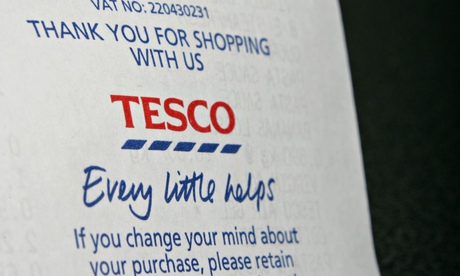
Turning around Tesco’s image is either the assignment of a lifetime, or the biggest headache imaginable. However, it is safe to assume that Neil Munn and Fraser Hardie are unafraid of the challenge. The two men – chief executive of advertising firm BBH and senior partner at reputation consultants Blue Rubicon respectively – have just been hired by Dave Lewis, Tesco’s chief executive since September.
Munn took over at BBH last year, 11 years after joining from Unilever, where Lewis spent 28 years before joining Tesco. BBH dreamed up the “Lynx effect” campaign for Lewis and ran the advertising for Vaseline, another of his products. “We’ve probably worked on and off together for 20 years,” Munn said.
Lewis and Munn met socially in December when Lewis asked if BBH would take over the Tesco account. Munn was wary because BBH worked for Tesco’s rival supermarket Waitrose, but the two men kept talking and Munn decided just before Christmas to drop Waitrose in favour of one of the biggest accounts in UK advertising. Munn said it was early days and BBH was working out a three-month notice period for Waitrose but that Tesco needed to put the customer first and rebuild trust in the company.
One of the first casualties of BBH’s overhaul could be Tesco’s well-worn “Every little helps” catchphrase, which it has used since the early 1990s but has recently been reinterpreted as “Every Lidl helps”. The phrase’s fate depends on how it works “in the current business reality”, Munn said.
“Tesco is in the spotlight at the moment and we’re happy to be there alongside them,” he added.
Hardie co-founded Blue Rubicon in 1999 and built it into one of the UK’s top advisers on corporate reputation. His job is to advise on Tesco’s broader strategic direction and restore faith in the company.
In blogposts on Blue Rubicon’s website, Hardie calls on companies to listen to their customers and to understand the importance of being a responsible citizen. One post reads: “The strongest brands will have a strong set of values and will be prepared to operate on the agendas that really matter to people. They will be driven by the world as it is, rather than how they would like it to be, and they will focus sharply on increasing their value in society as well as market segments.”
Hardie also reckons that company bosses need to be more open in their communications to protect their share prices. Tesco’s shares soared after Lewis unveiled his turnaround last week, but are still down a third over the past year.
Britain’s biggest retailer showed few concerns about its image when it was piling on profits, although at the same time there was increasing unrest about its treatment of suppliers and impact on small businesses. Families flocked to its stores in the belief that Tesco provided quality and good value.
But the horsemeat scandal of 2013 put a big dent in Tesco’s reputation for quality. To make matters worse, shoppers now no longer think Tesco is cheap and are shunning it for the discounters Aldi and Lidl.
They have also grown irritated with the big grocers’ baffling array of promotions.
Then there is the small matter of the £263m accounting scandal that exposed the vast sums Tesco demanded from its suppliers in order to get their goods displayed in stores.
City investors also need winning round. Some, including star fund manager Neil Woodford, think Tesco is uninvestable.
Independent retail analyst Nick Bubb said bringing in Hardie and Munn reflects Lewis’s previous career running brands for Unilever, but that prices and convenience are probably more important to Tesco shoppers.
“People thought it was a big, arrogant Tescopoly that took over the world and they need to counter that and make it a bit more human,” he said. “Whether ad campaigns make any difference, I’m not sure. But someone with Dave Lewis’s background will think they are pretty important.”

